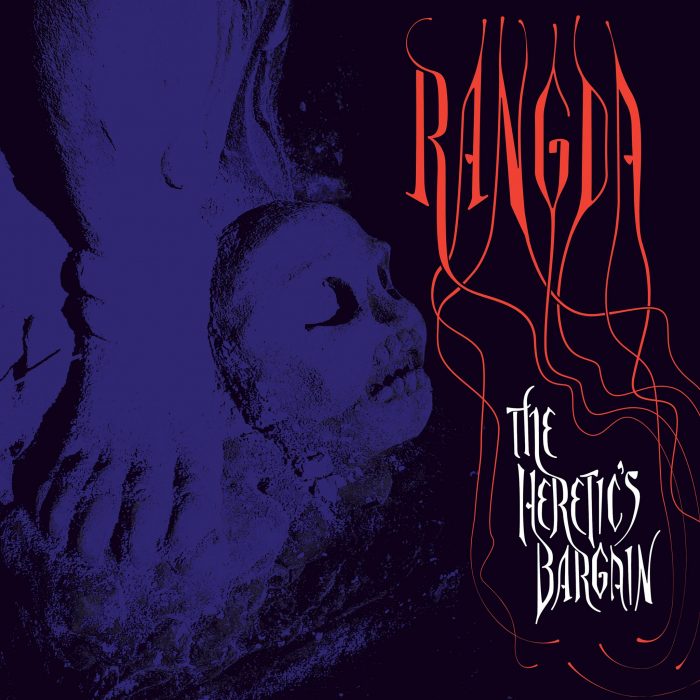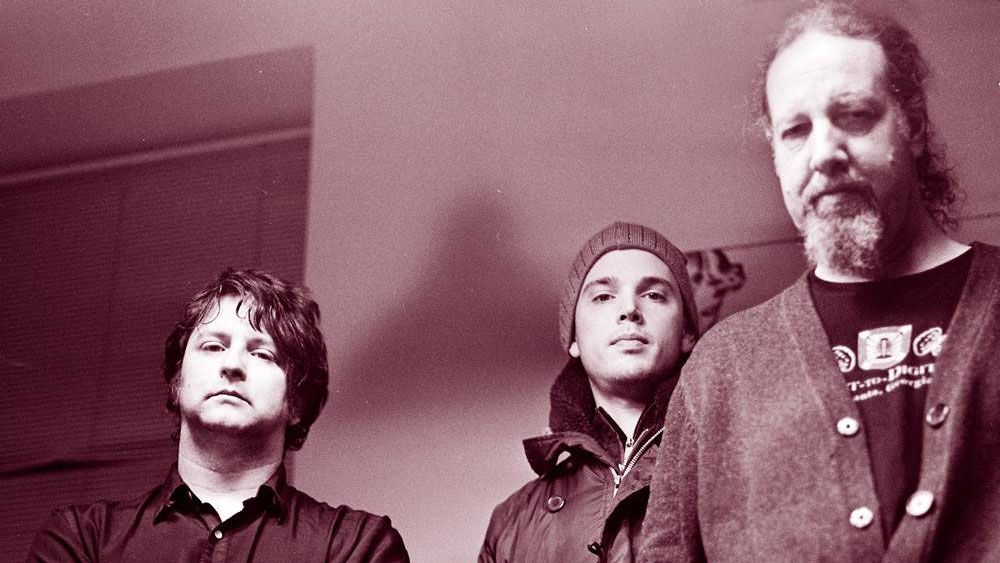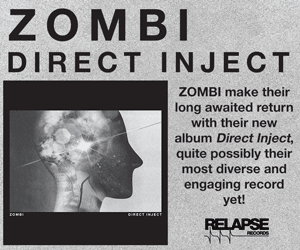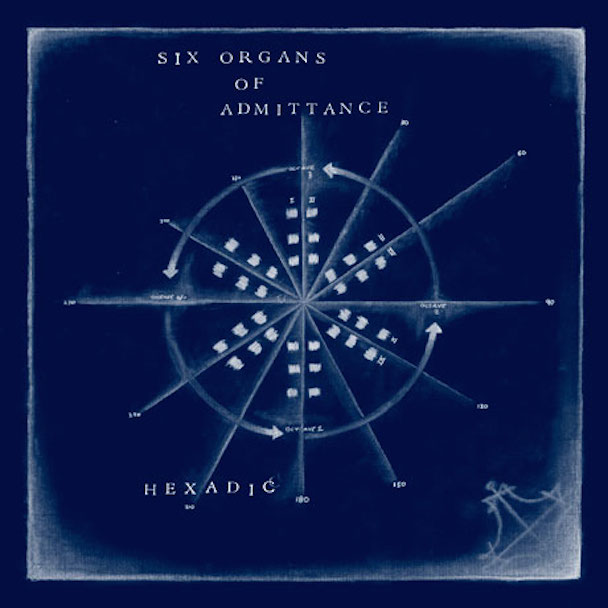When it comes to Rangda’s third album, The Heretic’s Bargain, Sir Richard Bishop, Ben Chasny, and Chris Corsano speak a business-as-usual musicianship. Rangda’s press release says different, “They planted a False Flag in the blood-soaked turf of the contemporary rock-politik. They were Formerly Extinct before you ever even THOUGHT about it up for good!” Gusto’s impetus isn’t clear, but it purports to be there, practiced, playing tangled melodies. Yet, I didn’t know what to ask Rangda’s status quo. What was there to say at this point?
Neither did I know about Chris Corsano. Corsano, an audacious drummer best known for his work on Bjork’s Volta as well as with Harry Pussy’s Bill Orcutt, wrote much of The Heretic’s Bargain. Rangda is a guitar band. Corsano won’t say what he wrote. He explains,
I won’t say which ones though, because maybe you’ll like them less knowing a drummer came up with the original idea. I haven’t heard any of the solo Kiss albums. And I don’t think I would like any of them. So maybe I’m a bad judge, but I have a hunch that the Peter Criss one is probably the worst. Know what I mean?
Ben Chasny, known as Six Organs of Admittance, put forth a new method of composition, the Hexadic System (catch up on our conversation last year here). His records Hexadic and Hexadic II are based on this system of guitar, cards, and time. Chasny left those big ideas behind,
With Rangda, I don’t feel there are really any grand concepts at play. I think we all just try to take everything we have learned in our various projects and turn it all loose… It’s a bit of a mad scientist laboratory I suppose. We all go out and collect our ingredients and then mix them up together.
And Sir Richard Bishop is the most prolific picker of the lot. Bishop was a member of the Sun City Girls, a trio with his brother Alan Bishop and Charles Gocher (who passed on in 2007, bringing the Girls to conclude with 2010’s Funeral Mariachi) that began in 1981 and by their end produced just shy of a hundred records.

This what we hashed out:
If False Flag emphasizes improvisation and Formerly Extinct more structured compositions, what is the method applied on Heretic’s Bargain? Or is it a greater refinement of your relationships?
BC: I feel the method to all the records is sort of the same. We work on a core group of songs or ways that we can play together and then use those ideas as the skeleton to build the record around. It’s the meat on the skeleton that seems to change over the years. I don’t feel we ever think about how that meat will grow or what it will look like. We just try to make that skeleton strong. The meat is a more organic process. There’s a lot of improvisation with the building of that meat. Perhaps the first record sounds more like it’s built from improvisation because we hadn’t figured out how to really let the meat grow yet, so there are some spaces between the muscles.
CC: I’d say it’s in keeping with the way we did the other two records, a mix of improvised and composed stuff.
RB: There’s no exact method. On every record so far, a lot of improvisational ideas ended up as structured parts with a few key riffs perhaps thought out ahead of time. It’s basically the three of us getting together after a long while apart, and just bouncing ideas off of each other, seeing what works and what doesn’t, and just fine-tuning things until everybody is pleased with the outcome.
Are there any artists that the three of you (individually or collectively) were influenced by for this album?
BC: I don’t think so. Its funny, this band seems to rarely talk about other bands as points of reference. It seems a lot of other people I play with use other musicians as a reference constantly. Not this band.
CC: Well, certain things about the drum approaches for stuff like Morricone, Erkin Koray, Can, Group Inerane filtered into my head at some point. But that was internally, it wasn’t anything that the band discussed. For the few guitar parts I came up with, I guess there’s a very direct and obvious influence from Ben & Rick’s playing – basically I was trying to cop their styles a little bit while filtering them through my clumsy, non-guitarist fingers. Then give it back to them to play with it in order to turn it into something people might actually want to hear. Also, one guitar part came from hearing a cimbalom player on the street in Brussels. That might be the most directly “influenced” part of the record from my point of view, but even then, it quickly mutated into something totally different than it’s origin.
RB: I think a lot of influences can come into play if I let them, but I purposely try to avoid anything from the outside and just work off of the energy that the three of us generate. That’s all that is needed and it seems to work well that way.
Why did you decide to name the record The Heretic’s Bargain? Did it just sound appealing or is there more?
RB: Oh, there’s way more but we’re not at liberty to discuss it – it’s part of the bargain in question. A deal is a deal!
Each of you are busy with non-Rangda work. I spoke to Chasny last year about his Hexadic System. Rick, you released Tangier Sessions. And Chris, you’ve released a number of collaborations, including this year’s Vooruit 17.05. Other than that, can you tell me about other projects you’ve been working on?
BC: Well, I’m always working on Six Organs. The Hexadic project continues, although I think the next release will be using more standard intervals and such. I’m working on music for a play about Wallace Stevens now. I guess besides Rangda, Six Organs is my main thing at the moment.
CC: 2015 was a lucky year for me and lots of things came out from groups I’d been playing with for a while. Actually, Ben put out a record by one of them on his Hermit Hut label–Vampire Belt, a duo with Bill Nace. Also, things with Mette Rasmussen, Bill Orcutt, Okkyung Lee, Evan Parker and John Edwards, and Joe McPhee came out. Plus a double LP with Akira Sakata/Jim O’Rourke/Merzbow/Darin Gray. Looks like a bunch of things with Paul Flaherty are happening this year–trios with Bill Nace, Mette Rasmussen, Steve Baczkowski and I think Feeding Tube records is going to do a double LP version of our first release, The Hated Music. So, I will continue to litter the record bins with releases for another year!
RB: I haven’t been doing much over the last 7 or 8 months, but I am starting to work on some new solo material which will venture away from the acoustic side of things and perhaps get a little louder and hopefully as incoherent as possible!
Rangda has always been an instrumental group, but why is that?
BC: With no bass, I think a singer would occupy too much of the same range as the guitars. There wouldn’t be much of a balance in terms of tonality.There would be too much of the same frequency. Plus, with singing you have to start thinking about words, and that automatically starts to push the band in a different direction. Maybe if the singer didn’t use words but just vocalized, perhaps that would work.
CC: Not sure. Just for no other reason than nobody’s grabbed a mic yet, maybe? I’d like to think anything is possible if the three of us want to try it. Right now, though, I’m happy for it to be an instrumental band and let the melodic content of the guitars tell the story.
RB: It’s not for me to say, but chances are that when Johnny Mathis joins the band, there will be vocals! And they’ll be wonderful!
Each of you displays a joking humor (despite slight differences) but did laughter bond Rangda? It is a style of humor that I too quickly want to label as absurd. Despite my labels, did this humor come about in playing music together? Was humor a catalyst for Rangda? And yet, Rick, in your work there has been a similar manner.
BC: One thing I really love about this band is the lightheartedness of it. Nothing is the end of the world. We enjoy each others’ company. The humor that comes out in things such as song titles are a relief for me since most of my other projects tend toward a more serious (some may say too serious) attitude. I suppose it’s absurd in it’s own way. We don’t really try to be absurd for its own sake. I think it’s just a lighthearted way of looking at things.
CC: Humor is one of the best to cope with the absurd nature of tours. Hours upon hours stuck in vans, planes, trains, cars, etc. for 60 minutes of music at the end of the day is a funny (strange, not ha-ha) way to spend your life, and aspects of that could (and do) wear me down if I don’t keep enough of a sense of humor to put things in perspective. But that’s not something that expresses itself in Rangda’s music, necessarily. Maybe in some of the song titles, but not the music itself. And not the title “Spiro Agnew,” though. We are TOTALLY FUCKING SERIOUS about calling that track “Spiro Agnew.” You don’t joke about a thing like that. Ever.
RB: I think all three of us have our own unique sense of humor (you have to in this business), each of which was birthed long before the three of us even met each other. And yes, this can reach the levels of absurdity as needed but wasn’t necessarily a catalyst in any way that’s tied to the music. In fact, we’re very serious when it comes to our music – and I find this to be hilarious!
The closing movement of “Hard Times Befall The Door-to-Door Glass Shard Salesman” into “Mondays Are Free At The Hermetic Museum” is really alluring. It breaks from the snaking melodies, crescendo and loss of structure, and it loosens into waves and this compelling new space that is then suddenly broken again by melody. How did you come to this moment?
BC: I don’t think there was any great mystery to this. I feel that after the main feedback and drum sections of Glass Shard it just seemed natural to let it decay and wind down to sort of a simpler breathing pattern; something like a false sense of security. And the longer that slower hypnotic part goes the more evident it becomes that something is about to change. It could easily be put into alchemical terms but I’ll refrain from that.
RB: Rickcelsus is right, we just sort of naturally let it disintegrate into it’s basic components. After such a harsh track, it’s nice to be babied a bit.
CC: Gotta keep people on their toes with a few plot twists now and again.
Banner photo by Aylin Gungor
Tour Dates:
- 3/14/16Milwaukee, WI
- 3/15/16Bloomington, IN
- 3/16/16Columbus, OH
- 3/17/16Pittsburgh, PA
- 3/18/16Baltimore, MD
- 3/19/16Philadelphia, PA
- 7/11/16London, United Kingdom
- 7/12/16London, United Kingdom
- 7/13/16London, United Kingdom




